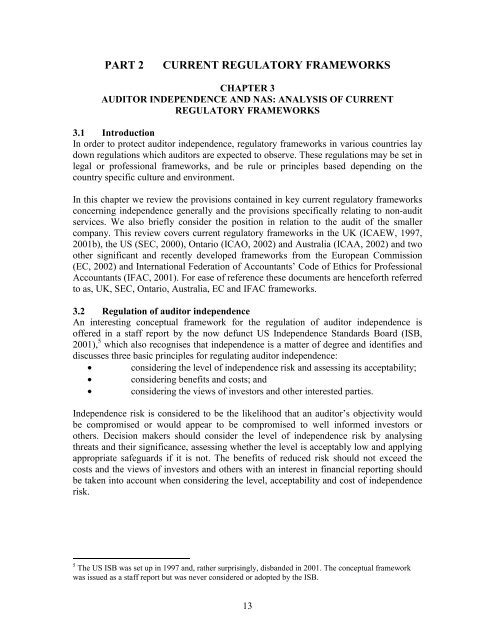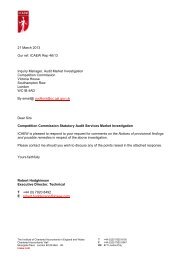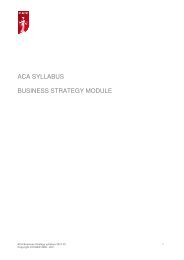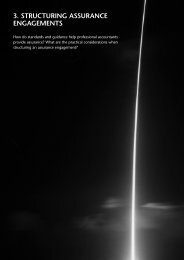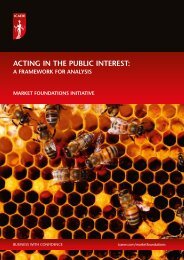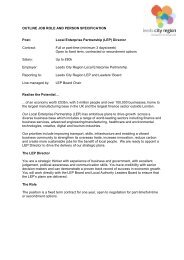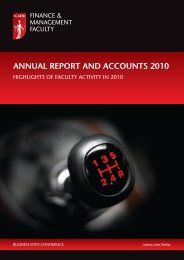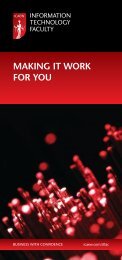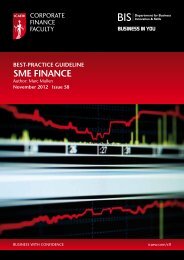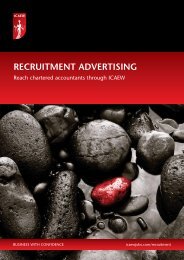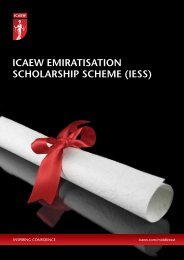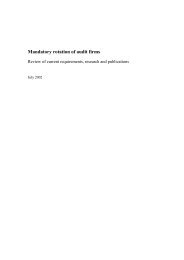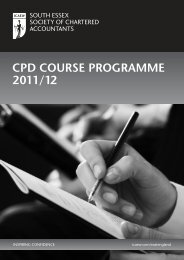Auditor independence and non-audit services - ICAEW
Auditor independence and non-audit services - ICAEW
Auditor independence and non-audit services - ICAEW
You also want an ePaper? Increase the reach of your titles
YUMPU automatically turns print PDFs into web optimized ePapers that Google loves.
PART 2CURRENT REGULATORY FRAMEWORKSCHAPTER 3AUDITOR INDEPENDENCE AND NAS: ANALYSIS OF CURRENTREGULATORY FRAMEWORKS3.1 IntroductionIn order to protect <strong>audit</strong>or <strong>independence</strong>, regulatory frameworks in various countries laydown regulations which <strong>audit</strong>ors are expected to observe. These regulations may be set inlegal or professional frameworks, <strong>and</strong> be rule or principles based depending on thecountry specific culture <strong>and</strong> environment.In this chapter we review the provisions contained in key current regulatory frameworksconcerning <strong>independence</strong> generally <strong>and</strong> the provisions specifically relating to <strong>non</strong>-<strong>audit</strong><strong>services</strong>. We also briefly consider the position in relation to the <strong>audit</strong> of the smallercompany. This review covers current regulatory frameworks in the UK (<strong>ICAEW</strong>, 1997,2001b), the US (SEC, 2000), Ontario (ICAO, 2002) <strong>and</strong> Australia (ICAA, 2002) <strong>and</strong> twoother significant <strong>and</strong> recently developed frameworks from the European Commission(EC, 2002) <strong>and</strong> International Federation of Accountants’ Code of Ethics for ProfessionalAccountants (IFAC, 2001). For ease of reference these documents are henceforth referredto as, UK, SEC, Ontario, Australia, EC <strong>and</strong> IFAC frameworks.3.2 Regulation of <strong>audit</strong>or <strong>independence</strong>An interesting conceptual framework for the regulation of <strong>audit</strong>or <strong>independence</strong> isoffered in a staff report by the now defunct US Independence St<strong>and</strong>ards Board (ISB,2001), 5 which also recognises that <strong>independence</strong> is a matter of degree <strong>and</strong> identifies <strong>and</strong>discusses three basic principles for regulating <strong>audit</strong>or <strong>independence</strong>:• considering the level of <strong>independence</strong> risk <strong>and</strong> assessing its acceptability;• considering benefits <strong>and</strong> costs; <strong>and</strong>• considering the views of investors <strong>and</strong> other interested parties.Independence risk is considered to be the likelihood that an <strong>audit</strong>or’s objectivity wouldbe compromised or would appear to be compromised to well informed investors orothers. Decision makers should consider the level of <strong>independence</strong> risk by analysingthreats <strong>and</strong> their significance, assessing whether the level is acceptably low <strong>and</strong> applyingappropriate safeguards if it is not. The benefits of reduced risk should not exceed thecosts <strong>and</strong> the views of investors <strong>and</strong> others with an interest in financial reporting shouldbe taken into account when considering the level, acceptability <strong>and</strong> cost of <strong>independence</strong>risk.5 The US ISB was set up in 1997 <strong>and</strong>, rather surprisingly, disb<strong>and</strong>ed in 2001. The conceptual frameworkwas issued as a staff report but was never considered or adopted by the ISB.13


